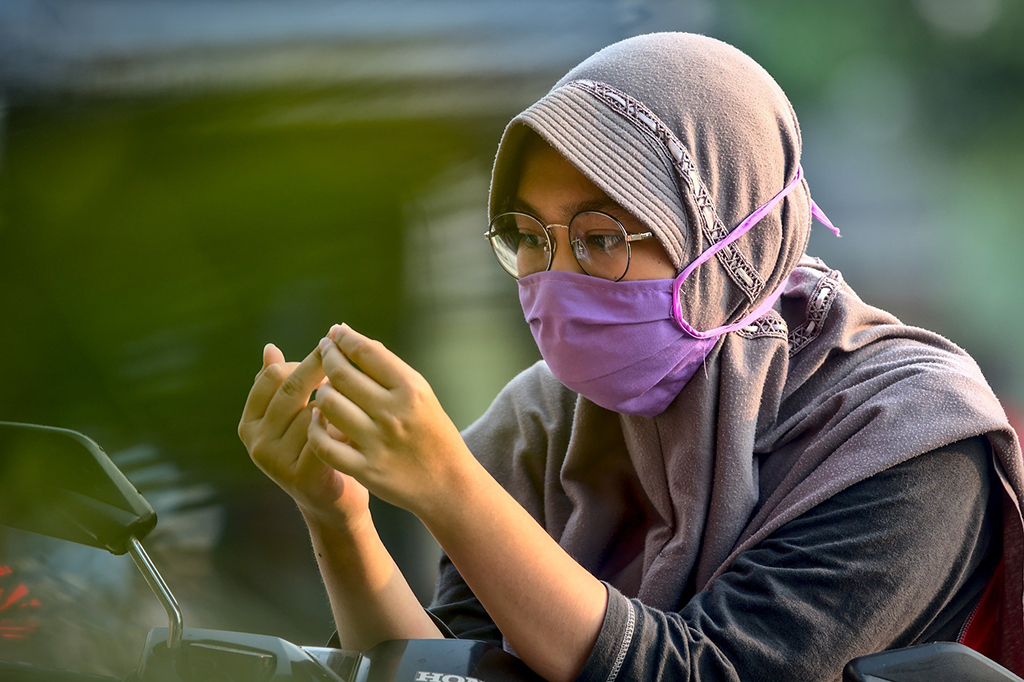Re-envisioning the Ummah in the ‘New Normal’
contributed by Nurul Fadiah Johari, 23 October 2020

Cover image: credited to user pisauikan, on pixabay
Introduction: Interrogating the ‘normal’
The emergence of the COVID-19 pandemic has undeniably been a watershed event in the 21st century. Much has been said about the various impacts of the pandemic, including the ways in which we organise and govern societies. These include forming new societal practices of safe distancing or the wearing of masks in public to ensure public health and safety. Such changes, termed as the state of the ‘new normal’, challenge certain social norms and practices. As we transition into the state of this so-called ‘new normal’, it is also as important for us to interrogate our taken-for-granted assumptions of normalcy. Certainly, the notion of normalcy is not simply about these practices, and has to go into our deeper assumptions about how we view and conduct ourselves as a society. The state of the new normal is also characterised by uncertainties and precariousness, not only in the aspect of public health, but also on matters of socio-economic stability.
I am of the position that what is deemed as normal is also that which has been defined by dominant groups and their ideologies in society. For example, what is assumed to be popular or common sense knowledge does not emerge in a vacuum. It does not become popular simply because many people resonate with it. It becomes dominant because it has been systemically entrenched by those in the position to wield mass influence, i.e. the elites in society. In this brief essay, I am keen in looking into the dominant religious discourses in the Muslim communities in the Malay world and the need to address the gaps in these discourses to confront the deeper social transformations in the new normal.
Dominant religious discourses on the pandemic
It is quite fascinating, if we are interested in understanding the role and place of religion in society, to examine the dominant responses articulated by the religious elites during this time of global crisis. The articulations of these elites speak to not only how the religion is to address public anxiety and social transformations, but also the way the elites position themselves vis-à-vis the public. The religious elites not only play the role of assuaging public anxieties in a time of crisis, but also defining how the society is to respond to the crisis. At this present juncture, I can identify several key themes in the responses by the Muslim religious elites in the Malay world. These responses undeniably reflect the dominant trends in Islamic discourse in the region. Here, I am addressing two themes, namely:
(i) The pandemic as a trial (or even punishment) from God
This is an oft-repeated narrative that is reproduced every time a society is faced with deep crisis. While I am not keen on debating the validity of this narrative, I would suggest that it is more important to examine the implications of such a belief system. Firstly, the idea that a crisis is necessarily a test from God creates an imagination of God as a wrathful and punitive being. It is a kind of religious imagination that shifts the blame away from the consequences of human actions (or inaction). While the state of crisis certainly tests the human mettle and aptitude for survival, this idea of a Divine punishment may drive people towards a fatalistic outlook. Certainly, there are grave social consequences to a fatalistic religious outlook.
The need to be patient while in this state of tribulation is thus often reinforced. While patience and resilience in the face of adversity are good virtues, it may also be mistaken for passivity and docility. This would mean that a society may not be moved to necessarily take action to resolve its issues, or to always wait for instructions from their leaders. The message of patience in times of crisis may also be appropriated by those in power to further entrench their positions in society.
(ii) Adjusting certain practices and rituals in the public sphere
Ritual practices play a primary and central role in the religious lives of Muslims in the Malay world. As such, it does not come as a surprise then that one of the greatest impacts of the COVID-19 is on the public participation of religious rituals. These include the performance of the Hajj in Mecca, performing mass congregation prayers on Fridays (predominantly for men), in the month of Ramadan and during the Eid celebrations. Other common public forms of religious activities include attending religious classes and holding large gatherings in mosques and other religious spaces.
While these practices are public in nature, they still revolve around the notion of personal piety. It is commonly believed that the public performance of religious rituals is more encouraged and will be rewarded more greatly by God. Nonetheless, it is still driven by the spirit of individual piety and this is why we see some Muslims struggling to adapt to safe distancing measures and the impact on these personal rituals. For instance, in Singapore, the government has developed a new online system for people to register their participation in order to secure a slot to perform the Friday prayers in the mosque. This is to regulate the number of mosque attendees and to ensure that different people will get their chance to attend the prayers.
It is interesting to see how some members of the public are disgruntled with this system as they feel a sense of deprivation from being able to exercise their religious duty. At the same time, I hear of others trying to ‘game’ the system - to try to secure more slots, even if they had just gotten one the week before. Systemic limitations aside, I think such societal attitudes and concerns point to the deeper religious orientation which emphasises on individual piety. Such concerns arise precisely because we have been taught that to be committed to our faith, we have to insist on performing the rituals in the same way as we are used to, even if we are living in a state of global crisis.
This uncompromising attitude on the performance of rituals points to the dominant orientation of ritualism, which can be seen in the Malay-Muslim society. Oftentimes, the emphasis on personal piety is done at the expense of what we can understand as social piety, or the aspect of the faith which focuses on social justice and compassion for others. In fact, I would argue that social piety is even more necessary in this current state of crisis, and should be the transformative force as we transition to the new normal.
The new normal and the need for a new socio-religious imagination
The state of the new normal, while ushering some changes in our social behaviours and interactions, may also simply reinforce existing ideologies and attitudes. As it is now, we not only observe heightened social anxieties, but we see the entrenchment of dominant power structures and the continued polarisation of society, based on class, race, gender, ideologies and so on. And undeniably, religion is often used to further ingrain and justify the polarisation.
There is thus a need to radically challenge religious authoritarianism and individualism, based on ideals of mutual interdependence, social justice and dialogical approaches to knowledge production and transmission. I am of the position that religious discourse and traditions can inspire a spirit of social justice and transformation, rather than being used to reinforce the same tired narratives and anxieties. A watershed event as critical as the COVID-19 pandemic can and should be turned into a much-needed push for deep social transformation.
It is timely to examine religious discourses which can address the shortcomings of the dominant ones. One example is to question the emphasis on individual piety at the expense of the focus on working towards the common good of all creation. The notion of individual piety and the desire to gain more rewards for the Hereafter can be seen as the dominant belief system which shapes the Muslim religious imagination in this region. This is expressed through the language of punishment and rewards, both in this life and the next, as well as a kind of religious understanding that is shaped by what is permissible and forbidden (halal and haram). We see this type of preoccupation in religious sermons, articles written in books, newspapers and online, as well as in public discussions both online and offline. Thus, one of the struggles we find among Muslims during the new normal is to adapt to the changes in religious practices, since individual piety is mostly expressed through the performance of rituals and abiding to the do’s and don’ts.
It is also important to identify the gaps in the dominant discourses and examine how we can shift some of these discourses. A way to address the shortcomings of the idea of individual piety is to examine how this current state of crisis necessitates deeper societal cooperation and interdependence. This means that while we talk about being patient in the face of adversity and adjust some of our religious practices, we should also consider how our religious understanding can help to foster a deeper sense of interdependence and appetite for social justice.
Firstly, we can start by examining religious discourses, oftentimes marginalised, which emphasise on a more humanistic and socially conscious approach towards religion. For instance, there have been scholars in the Malay world who advocate for the importance of social piety, or kesalehan sosial in Bahasa Indonesia. While not discounting the importance of personal faith and practices, the need for social piety as a religious imperative reinstates the drive for social justice that was exemplified during the life of the Prophet and his companions. Other Muslim scholars and activists in this region have tirelessly advocated for a transformative approach towards the religion in addressing social injustices and championing the rights of the marginalised.
Some scholars from the 20th century, such as H.O.S Tjokroaminoto (Indonesia) and Syed Hussein Alatas (Malaysia) have even talked about how socialist principles are not alien to the Islamic tradition. Tjokroaminoto, in his book Islam dan Sosialisme (Islam and Socialism) (1920), for instance reminds us of the prophetic tradition about how the members of the Muslim community are like parts of the same body, such that when one of its parts is hurt, the whole body will suffer. He also refers to the lived realities of the Prophet, who shunned social hierarchies and sought to promote more egalitarian social relations from within the home and in the broader society.
In a time of greater socio-economic inequalities, a more socially conscious approach towards religion can foster not only a heightened sensitivity towards the plight of the marginalised, but also inspire a thirst for social transformation. We see the emergence, in this region, of groups and spaces which reflect a deep sense of social piety. Some examples include creation of mutual aid groups and various other community initiatives to support the poor. There is also a greater awareness to address mental health needs - especially during this pandemic era - and so we see the creation of safe spaces, support groups and dialogue circles which affirm the voices and experiences of the marginalised. We also see how social media is used to promote various social causes, such as campaigns addressing domestic violence from within the Malay-Muslim community in Singapore. Social media, which oftentimes serves as a tool for societal polarisation, can also be used to promote dynamism in civic participation and a more dialogical approach towards the production and transmission of knowledge through critical engagements.
These forms of social consciousness and participation may not always be seen as religious imperatives, if our sense of religiosity is reduced to individual piety. This is why the push for greater social consciousness should also be accompanied by shifts in the dominant discourses, so as to not create a false sense of incongruity between one’s religious and social responsibilities. In fact, the struggle for social justice should be promoted as a form of worship or a key aspect of one’s spiritual life as well.
Conclusion
The state of the new normal should also be accompanied with fundamental shifts in our understanding of society. This means a deeper appreciation of mutual interdependence, as opposed to greater polarisation and the widening of cracks in society. In this essay, I suggest the need to revisit and bring to the fore some marginalised traditions to inspire a new spirit in this state of new normal. The quest for social justice should be seen as a religious imperative and calling – one that is imbued with Islamic virtues of compassion and mutual interdependence. Instead of reinforcing the same power structures and societal divides, the pandemic should also serve as a point of deep self-reflection for the Muslim community and raising awareness towards improving the living conditions of the community.
Nurul Fadiah Johari is a Research Associate at the Social Service Research Centre in NUS. Her research interests include the interplay of power and ideology in the construction of dominant narratives on socio-economic issues, as well as the intersection of socio-economic class, ethnicity and gender in the shaping of policies and their impact on marginalised communities.
Disclaimer: The views and opinions expressed in this article are those of the authors and do not necessarily reflect the position of the blog editorial team or the Asia Research Institute.
South Asia | Southeast Asia | East Asia | Other Places | Hinduism | Buddhism | Islam | Christianity | Other Religions



